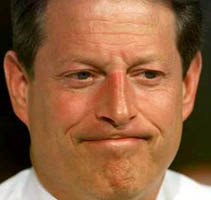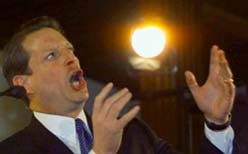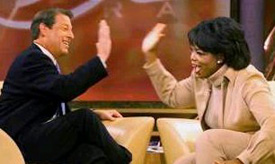
Seth Gitell
Gore, like Dicken's Jacob Marley, Dead as a Door-nail
http://www.NewsAndOpinion.com | DESPITE FORMER vice-president Al Gore's recent spate of publicity, his fate recalls the opening lines of Charles Dickens's A Christmas Carol. "Marley was dead: to begin with. There is no doubt whatever about that." Substitute Gore's name for Jacob Marley's and you'll get a sense of where the 2000 Democratic nominee is politically. His heavily promoted new book, Joined at the Heart: The Transformation of the American Family (Henry Holt), which he co-wrote with his wife, Tipper, is ranked 3065 on Amazon.com.
Such titles as Who's Sorry Now: The True Story of a Stand-Up Guy (Dutton), a memoir by former The Sopranos actor Joe Pantoliano (1575 on Amazon's list), is selling more copies, as is Steven Emerson's anti-terrorist manifesto American Jihad: The Terrorists Living Among Us (Free Press), which is at 1386. (In a painful irony, a book about George W. Bush, Bob Woodward's Bush at War [Simon & Schuster], is second on Amazon's list.) Meanwhile, a slew of Democratic insiders, such as speechwriter and consultant Robert Shrum as well as Gore's former senior adviser Michael Whouley, have given up on him. Even his old pal, fundraiser Steve Grossman, is joining up with a political long shot, Governor Howard Dean of Vermont. In political terms, Gore is as dead as Marley.
It wasn't supposed to be like this, not for the politician who won the popular vote against Bush in 2000 and likely would have won in the Electoral College had not the justices of the US Supreme Court ruled against him. In the months after Bush was inaugurated, Gore established himself as a de facto government-in-exile - first quietly and then more vocally issuing statements critical of the Bush administration. By the time Gore was ready to enter the active political arena, he was supposed to be welcomed back by Democrats longing to regain what should have been theirs in 2000.
 |
But that hasn't happened. The more media appearances Gore has made - ostensibly flogging his book, but make no mistake, it's a political dry run - the worse he appears. From appearances with David Letterman on CBS, Larry King on CNN, and Barbara Walters on ABC to a spot on NBC's Today show with Katie Couric, Gore's appeal seems to diminish. He scored a few points on Letterman by joking about how 50.1 percent of the people feel that he screwed up and growing intentionally stiff and silent when Letterman asked him whether the events of 2000 made him angry - a variation of an old Gore joke where he acts robotic when asked to display personality. But he didn't fare as well on most of the shows. He certainly didn't help himself by first showing up late for Larry King Live, and then refusing to agree, when King pressed him, that he probably should have let President Bill Clinton campaign for him. Chuck Raasch, a political writer with the Gannett News Service, described the new Gore as very much "the Old Gore: Scripted, carefully parsed, with newly evolved imagery and positions on issues." The only praise he's managed to score has come from an unwanted corner: public relations. PR Week's December 2 issue designated Gore's "charm offensive" the "PR Play of the Week."
It's no surprise, then, that perennial Gore critics, such as JWR contributor Michael Kelly and National Review Online's David Frum, have come in for attack, especially in view of several recent speeches designed to retool the old presidential candidate. Speaking to a Manhattan audience on November 13, for example, Gore announced that he had "reluctantly" concluded that the nation needs a Canadian-style single-payer health-care system. (This from the man who eviscerated former senator Bill Bradley during the 2000 Democratic presidential primary for saying the same thing.) Kelly and Frum have panned Gore during his book tour and faulted the former vice-president for his move to the left.
More interesting is the poor reception Gore is getting from generally liberal commentators. New York Times columnist Frank Rich faulted the would-be president for his performance with Couric, who, Rich wrote, uncovered "the old Al Gore lurking inside the latest model" in all of three minutes. Couric had a hard time pinning Gore down on how he would handle Saddam Hussein; when he finally answered her question, the best he could muster was a plan to call for a unanimous United Nations Security Council vote.
 |
Likewise, LA Weekly editor-at-large Marc Cooper skewers this latest "progressive" version of Gore in the alternative paper's November 29 issue. "So in this matchlessly dreary political moment, the least Al Gore can do to marginally improve matters is to get his mug off the tube and dig back in to wherever he lurks between his pop-up appearances," writes Cooper. "Go grow another beard, Al. Or write another book. But please, please, don't run for president again." Ouch.
Cooper's sentiments are not unique among Democrats. A Los Angeles Times poll of Democratic National Committee members found that 48 percent opposed a 2004 presidential run by the former vice-president. Such a finding leads to one conclusion: Gore's political prospects are dim at best. The poll, coupled with his less-than-warm reception by opinion leaders and his insistence on being coy about his intentions (he told Larry King, among others, that he'd make a decision about 2004 "over the holidays") means one thing: Gore is toast, but he doesn't know it. The poor guy is an apparition, much like Dickens's Marley. He wanders the earth from television station to television station, as if his political prospects were still alive.
Given Gore's name recognition, if he does throw his hat into the ring, he instantly becomes the candidate to beat. A November poll by Quinnipiac University showed Gore with the support of a little less than one-third of American voters, followed by Hillary Rodham Clinton at 22 percent, Senate minority leader Tom Daschle with 11 percent, and Connecticut senator Joe Lieberman, Massachusetts senator John Kerry, and Missouri congressman Richard Gephardt tied at eight percent. It sounds good until you consider that Gore was the Democratic nominee in 2000, and the popular-vote winner at that; he should be much higher than 32 percent. (A recent Washington Post poll of Democratic voters that didn't include Hillary Clinton put Gore at 49 percent. Even so, 54 percent of those respondents said they opposed recycling the Gore-Lieberman ticket.) One thing is clear: other candidates aren't afraid of him. On Sunday, Kerry announced his intention to form an exploratory committee, the precursor to a presidential run. Asked about Gore at a Boston press conference on Monday, Kerry said, "If I were daunted, I wouldn't have announced what I announced yesterday."
All of which raises a question: what went wrong?
![]()
IF YOU LISTEN to Gore, the media are a big part of what went wrong. He told Josh Benson of the New York Observer that there's a "fifth column" within the media that supports the "extreme right wing." "Fox News Network, the Washington Times, Rush Limbaugh - there's a bunch of them, and some of them are financed by wealthy ultra-conservative billionaires who make political deals with Republican administrations and the rest of the media," Gore said. His refrain seems derivative of Hillary Clinton's claim in 1998 that there was a "vast right-wing conspiracy" arrayed against her husband. Notwithstanding the fact that her husband walked - or rather unzipped - his way into the trap the right wing laid out for him, there was more than just a kernel of truth in her words, as there is in Gore's. But so what?
Even with the abuse Gore receives almost daily on talk radio, administered on such venues as Limbaugh's nationally aired program and Jay Severin's WTKK local show, he was still able to get his message out in the "free media" during the month of November. Not that Gore is blaming all his problems on the right wing. Speaking to Benson, he acknowledged that he himself might be at the root of some of them. "Maybe I bear the blame for some of it," he told the Observer. "I haven't been very good about calling all of the insiders over the last two years."
 |
Indeed. Much of Gore's disappointing return to the limelight, in fact, can be linked to the vehicle he selected to mark his comeback, his and Tipper's 417-page tome on the American family. Joined at the Heart is an odd, disjointed mix of anecdotes, policy, history, and bromides - all of which might have been fine if the book worked politically. But it doesn't.
For starters, the very topic of the book, the American family, isn't exactly what's on the public's mind these days. The book might have worked as a political vehicle in the mid 1990s, when the culture wars made their way into national debates on welfare, gay rights, and working mothers, and the national Democratic Party was finding a new voice on domestic policy. But to ask, as the Gores do in the book's opening pages, "How do we deal with all the extraordinary changes that American families have been going through in the past few decades?" seems extraordinarily tone deaf in the wake of the September 11 attacks, which triggered urgent security concerns. Besides, similar terrain was covered six years ago in Hillary Rodham Clinton's oft-ridiculed book, It Takes A Village: And Other Lessons Children Teach Us, published by Simon & Schuster in 1996.
It's hard to say what the Gores' book brings to the general table of family and childrearing that Clinton's didn't much earlier, more memorably, and with greater attentiveness to policy development. And as easy as it is to make fun of the phrase "it takes a village," it's one that resonates with a certain block of voters. What's so frustrating about all this - a frustration that echoes critiques of Gore's 2000 run for president - is that he's so clearly capable of much more. Take his 1992 book Earth in Balance: Ecology and the Human Spirit (Houghton Mifflin). Back then, Gore was one of the first mainstream politicians to draw attention to the crisis in the environment. (His environmental advocacy won him the moniker "Nature Boy" from the first president Bush. No, it wasn't a compliment.) His book established the Tennessee senator as an innovator and thinker who was ahead of his time on an important issue. But with his and Tipper's book on the American family, Gore is following, not leading.
Today, the public is worried about terrorism, and that's reflected in the fact that roughly a third of the books on the New York Times' bestseller list are either about the war on terror or inextricably linked to it: Leadership, by Rudolph Giuliani (Miramax); Let's Roll!, by Lisa Beamer (Tyndale); Let Freedom Ring: Winning the War of Liberty over Liberalism, by Sean Hannity (HarperCollins), and American: Beyond Our Grandest Notions, by Chris Matthews (Free Press). All of which show that even bad books can be important books if they strike a chord; Gore's doesn't.
Making matters worse, the Gores seemed aware that the moment for a book on "family" had passed - yet they didn't adjust accordingly! They write: "[I]n the months that have passed since the attacks of September 11, 2001, a lot of people have told us that they have been thinking long and hard about what is important to them in life - and have concluded, as we have, that a big part of the answer is family." That may be true, but surely just as big a part of the answer is domestic security: airport safety, guarding our nuclear reactors from attack, protecting the water supply, preventing another anthrax nightmare. It's hard to say what Gore was thinking - or if he was thinking at all - when he settled on the theme of his and Tipper's book. Regardless, it should have been painfully obvious that a book on families wouldn't make the same splash politically as it might have had the attacks never taken place.
 |
One Gore-related project that might have survived the new post-September 11 realities would have been a straightforward memoir about his life. (Senator John McCain of Arizona scored by writing not one, but two such books, both of which are selling more copies than Joined at the Heart.) An obvious failing of Gore's 2000 presidential bid was his inability to convey an authentic personality to voters. One of the reasons Gore, the designated successor to a popular president running in economically good times, failed to defeat Bush decisively was that many voters found themselves asking the question, who is Al Gore? - even after he'd spent eight years in office as vice-president. If Gore had written a readable memoir, he could have gotten his personality and identity across without media interference. Such a book could have revealed what it was like for Gore to grow up a senator's son, and related stories about his service in Vietnam, his marriage to Tipper, and his tenure in the House, Senate, and the White House.
In an autobiography, he also could have addressed one of the key failings of his 2000 candidacy: his inability to sum up his contribution to the Clinton administration. And it's something he continues to have trouble with, as his November media blitz shows. Why he has this problem, given the historic nature of his vice-presidency - he was surely the most activist and involved number-two man in the nation's history up to that point - is a mystery. Clinton delegated crucial duties to Gore: the environment, arms proliferation, Russia. Gore even had his own adviser on the National Security Council. But he has been reluctant to talk about how he influenced the president. Interestingly, back in September, Gore's former legal counsel, Charles Burson, addressed a small gathering in the law offices of Mintz, Levin. Burson told a fascinating story about how Gore - over the opposition of the White House's political team - made the decision to attend the international meeting on air pollution in Kyoto, Japan. (See "Today's Jolt," September 26, 2002.) Retelling that story in a book-length memoir would have given Gore the opportunity to highlight his own views on the environment and international affairs, and to do so in a way that compares favorably with the views of both Clinton and Bush.
THERE IS a strategy behind Gore's recent public appearances: appeal to the base. Gore opposes military action against Iraq - in contrast to the position he took in 1991, when he was just one of 10 Democratic senators who voted for the original Gulf War. (Granted, Gore can argue that the first Gulf War was a response to Hussein's invasion of Kuwait, whereas the current president's proposed war would amount to an attempt to remove Saddam Hussein preemptively.) He also has moved left on economic matters - he wants to cancel the Bush tax cut - and has basically pirated the position of his 2000 primary rival, Bill Bradley, on health care.
But none of this plays well. Throughout his career, Gore has been through more changes than Windows. Gore 1.0 was a pro-life moderate Democrat. Gore 1.1 was a pro-Israel hawk who ran against Michael Dukakis, Dick Gephardt, and Jesse Jackson from the right in the 1988 New York primary. Gore 2.0, which emerged during the Clinton administration, was the point man on getting the North American Free Trade Agreement passed. This sort of background makes it unlikely that he could ever really win over the progressive wing of the Democratic Party - especially in primary battles with the likes of Al Sharpton flanking his left.
The essence of the LA Weekly's anti-Gore rant by Cooper is that the former vice-president is an untrustworthy agent of progressivism. "As recently as during the 2000 primary, he relentlessly attacked rival Bill Bradley as some sort of soft-brained leftist when the former senator presented his own rather modest national health-care plan.... And now Gore is out there sounding like some sort of Stockholm socialist?" Cooper asks, lambasting the 1988 presidency seeker for being the first to attack candidate Michael Dukakis with the "race-baiting Willie Horton strategy." No, a strategic move leftward is not exactly enthralling the party faithful - and is not likely to do so in the future.
All that said, it's not impossible to wage a comeback in politics. No candidate could have been further down than Richard Nixon after he lost the 1962 governor's race in California to Edmund "Pat" Brown, which came after he lost the presidency in 1960 to John F. Kennedy. The defeat elicited Nixon's oft-quoted line: "You won't have Nixon to kick around anymore, because, gentlemen, this is my last press conference." How did Nixon come back? First off, he waited an entire presidential-election cycle to try, sitting out the election of 1964 (which Arizona senator Barry Goldwater, running as a candidate of the far right, lost disastrously to Lyndon Johnson). Then, in 1968, Nixon appeared on the NBC comedy show Rowan and Martin's Laugh-In. "The Nixon of 1968 was so different from the Nixon of 1960 that the whole personality required re-exploration," wrote Theodore White in The Making of the President, 1968. As that tumultuous year drew to a close, Nixon was elected president of the United States.
You know things are tough when you have to look to a politician like Nixon for inspiration. But Gore seems to be taking at least one page from Nixon's playbook. He'll be on Saturday Night Live - the modern equivalent of Laugh-In - on December 14. But if lightning fails to strike, it might take the visit of three Christmas Eve apparitions to convince Gore of the errors of his ways.
JWR contributor Seth Gitell is the political writer of the Boston Phoenix Comment by clicking here.
10/24/02: War with Iraq may not happen, after all
10/22/02: Winning European hearts and minds
10/18/02: Lieberman makes 'em laugh --- on purpose
10/04/02: Hawking an interpretation (in which Scott Ritter tells our columnist to 'go to H-LL!')
09/13/02: Bush Challenge to U.N. Members: Are You Better than League of Nations?
09/06/02: Iraq attack: Ritter's reversal
08/30/02: Stick with comedy, Jon Stewart
08/16/02: Green around the gills: Nader Effect could cost the Dems the election in three states
08/01/02: Gore's low profile is no accident
07/31/02: President Hillary? Despite her denials, candidacy is not that unlikely
07/26/02: On the road with John Kerry
07/17/02: Meet the 'Clinton' of the 2004 New Hampshire primary
07/12/02: Ancient rivalry: Williams vs. DiMaggio
07/10/02: Warrior spirit
05/08/02: Hosting a TV show will keep Clinton off the streets
04/26/02: Truth in advertising in SaudiLand --- and ours
02/28/02: Time for hipsters to do a reality-check

